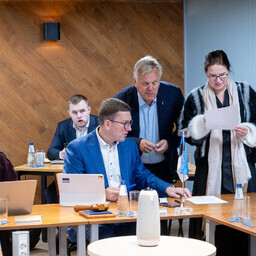Many have the feeling that now we should start a race for this 800 million. No. We will not start distributing this 800 million in any additional way. No one has found a gold mine or oil rivers. This still means that the Estonian state spends less and operates more frugally.
We are honest that the basis for this has also been a number of difficult decisions. The most important one is certainly the course of action of Estonian entrepreneurs, enterprising people, and the Estonian people, which has been slightly better. This means that more corporate income tax has been collected, more personal income tax has been collected, wages have grown, which is positive.
But we have also managed to reduce various administrative costs and postpone investments. This simply means that some things are done later, some things are left undone. Last year, as you remember, there were discussions about when various state buildings and facilities would appear. All these projects have been moved forward as much as possible, some are coming, some will not come. And in this way, the state presumably saves money.
According to Michal, Estonian society has been more diligent, and the state's finances are better than expected. And I also understand that there are two directions. One direction is certainly those who say that now everything must be distributed. The answer is that we continue to operate more modestly, we certainly cut. And the other direction is those who do not want to believe it at all, because it does not fit their narrative that everything in Estonia is fine. So be it, let them continue their talk. But the finances of the Estonian state are in better condition than expected. This is a fact, in numbers.
Michal repeated that the government is discussing the possibility of leaving out the income tax increase next year and finding ways to raise the salaries of teachers, cultural workers, rescuers, and police officers. Kristina Kallas added that if in the last three years the government was worried about whether to take a loan to cover the state's fixed costs, now the fixed costs are under control. The effort that the Estonian people have made to ensure that our society remains vital and sustainable, that our state's fixed costs are in order, we have achieved this today, meaning our structural deficit has turned into a surplus. Our state budget is in order, and this gives us the opportunity to talk about potential investments in the future.

